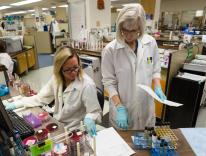“I believe in the living God.” The Bishop of Marsabit repeated this several times during our brief courtesy visit. Most strikingly, at one point he said “I believe in the living God, and I trust no one will die of this.”
I met the bishop while on a visit to Northern Kenya. Marsabit is the largest of Kenya’s forty-seven counties, but sparsely populated and therefore politically marginal. It is part of a region in East Africa currently experiencing an extraordinary drought, the worst in living memory—worse even than the drought that brought the Ethiopian famine of the 1980s.
Most of us haven’t heard much about the crisis affecting Somalia, South Sudan, Ethiopia, and Northern Kenya. This is partly because their governments don’t want to declare a famine—it’s not a good look for them. It is also because NGOs struggle to draw media attention to a slow-onset disaster, especially at a time when humanitarian interest has been so focused on Ukraine. In the past, one might have brought celebrities into a situation like this, and media interest would follow, but concerns about “white saviorism” have blocked that strategy. Since the ’80s, communities in the region have developed their resilience, their capacity to survive difficult conditions, but the extraordinary severity of this drought—widely considered a consequence of climate change—has pushed past what they can manage. The effects of climate change, in other words, have wiped out progress made over four decades, and left the people worse off than before. It’s a grim situation, and an absolutely unjust one. It is also very frightening.
I was visiting Marsabit with the Catholic Agency for Overseas Development (CAFOD), a British Catholic development agency, but I am a theologian rather than a development specialist. Perhaps this is why I found myself wrestling so much with the bishop’s words: “I believe in the living God, and I trust no one will die of this.” That no one will die seemed to me, unfortunately, extremely unlikely. And yet I sensed that there was something right in what he said. To hear him affirm his trust was, I felt in some obscure way, to be taught something of what faith itself means.
Before stopping off to see the bishop, we had spent much of the day touring an extraordinarily parched and dusty landscape, almost a moonscape. Again and again we’d seen the bodies of dead camels and donkeys. There’s something haunting in the sight of a camel that has perished from drought. Across the day we’d met several groups of pastoralists, and heard their stories, their anxiety, their sense of shock. In losing their animals they have lost their source of milk, meat, cash, savings, and employment. What can you do when the herds have all died?
Just as important were the things we didn’t see. There were no convoys of trucks bringing relief. We didn’t see the logos of the various humanitarian agencies. Our guide that day, a man born into these same pastoralist communities and now head of Marsabit diocese’s humanitarian wing, told us of a major mismatch between the scale of need and the level of resources. He spoke very positively of a longer-term project involving Catholic Relief Services, and for the immediate crisis there had been some support from CAFOD and its German counterpart, Misereor, but nothing like enough. This is why the part of my brain that computes odds believed—and continues to believe—that people will indeed die from this famine.
The bishop of course knew much better than I did the reality of the situation. One could sense the weight of it in what he said, the way it pressed upon him. Wherever his affirmation of trust came from, I cannot believe it was ignorance, or some lazy optimism. Perhaps what he said was rooted in the love and connection to the particular people and communities in his diocese. To him they are not examples of a general truth—sometimes there are famines, and when relief doesn’t come, people die. For him they are real, concrete, familiar, particular, beloved individuals and families and villages. For those whom we know and love, we keep hope open as long as we possibly can, refusing to accommodate ourselves to a terrible probability. We continue to search the horizon, to hope and pray for things to take an unexpected twist.
And perhaps his response was also rooted in another reality he knew very well, which is that relief could perfectly well be brought to these communities. Their suffering and death is not inevitable. There is a paved road to Marsabit. As we had traveled along it the day before, we passed giant polytunnels in which Kenya grows food and flowers for export to Europe. If people in Marsabit and all across the horn of Africa die of famine, it will not be the result of some natural evil—just a sad outcome of the way the weather works. It will be because of actions not taken. It will be the result of a lack of interest where there should have been interest, a lack of attention, a lack of care.
Sometimes I teach my students about the understanding of evil as privation. Augustine was its classic proponent, in his rejection of Manichaean dualism. On this view, evil is not a distinctive thing in itself, some separate substance, but a lack, an absence in what should be. To my students the notion of evil as privation can seem unimpressive, too weak and tame to capture what is so dramatically wrong with things. When I think about the likely outcome of our own and the world’s absence of attention in this crisis in East Africa, though, I am not so sure.
I too believe in the living God, or I try to. And so I hope against hope that God’s Spirit will stir up something in our hearts, and I hope against hope that the bishop of Marsabit will be right after all.
